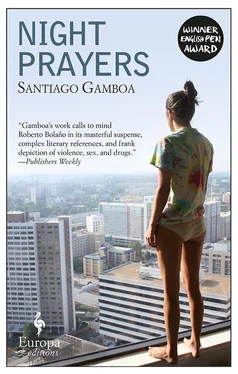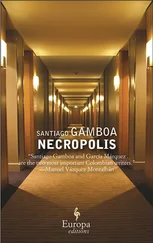Sometime later I saw Edgar among the others. He was dancing with Daniela and around them there were other girls raising their glasses and drinking toasts in time to reggae or rap or some other kind of music. I looked at my watch: an hour and a half had gone by. I felt hungry and was starting to get impatient. It didn’t look as if Edgar wanted to leave. Slowly I walked back along the corridor, opened the door, and walked to the elevators. When one of them opened, two classmates who were arriving late came out, laughing loudly.
How’s the party? they asked, is it good?
Very good, I said, and pointed to the door at the end of the corridor. They didn’t even register the fact that I was leaving.
I went outside. It was drizzling.
I didn’t have money for a taxi so I started walking without worrying about the drizzle. I’d have liked to have my paint cans with me, and I thought that if it stopped raining I’d go to the wall. I had an urgent need to express something: revulsion, anger, humiliation. I missed my colors, but there was still quite some way to go. After a few blocks I noticed something in my jacket pocket. I put my hand in, it was the gift I hadn’t managed to hand over. I opened it to see what Mother had bought, and to be honest I was pleased I still had it with me. A box of handkerchiefs. I threw it in the nearest trash can and carried on along Seventh. If I was lucky I could find a bus that went to Usaquén.
When I got home the lights were still on, so I decided to wait. Father and Mother were watching television in the living room. I took out my cell phone, thinking I might call Juana, but then remembered she was traveling. Under the eave of the garage there was a dry spot and I sat down to wait. It was still raining, more heavily now. I was cold and tired, but I’d received a lesson that was more important than the cold and the tiredness.
I never went back to Edgar’s house, in spite of his repeated invitations. We’d see each other at recess and he’d ask me, what’s up, brother? but I’d say, nothing, problems at home, I’ll tell you later. He told me about the party, how the time had passed and they’d gotten him drunk.
I fucked Daniela in the bathroom, man, he said, on all fours and against the washbowl, and I almost fucked the other whore too.
But I didn’t listen to him, just smiled and shrugged. With time he got tired of seeking me out.
It was better that way.
Losing my only friend strengthened me, Consul. Solitude accentuates what you have inside you, so now I devoted myself to walls. I had already seen one in the upper part of Usaquén, more than three hundred feet high. It was on the edge of a lot where they were going to start building something. It wasn’t completely clean, of course, it already had a few things on it, rude drawings, the odd word, hearts, a few old posters, but, far from bothering me, this gave me strength, as if the soul of the wall was in a crude state, just waiting for an image.
I went the next day, still feeling revulsion at the previous night. My hands were shaking as I grabbed the spray can. It was my first wall outside my own neighborhood and that was tantamount to a conquest, to pushing back the frontiers, broadening my horizons. I looked at it for a while from the opposite sidewalk and felt it palpitating, so the first thing I painted was just that, the silhouette of a palpitating heart, a heart that was at the same time a small continent drifting, and as I contemplated it from the sidewalk, it acquired relief, its veins and folds emerged, along with the outline of the surrounding water, the devouring monsters, the storms that lay in wait for it.
The cans sped through my fingers as if everything already existed, in the spirit or the soul of the wall, until I could do no more and I sat down to look at the stars, the lights of the houses. Then, already calmer, I contemplated my drawing, that small piece of my world in a distant street, at the beginning of night, and I felt comforted. I turned and looked at it again from the corner and it filled me with resolve. Suddenly I felt something on my cheeks, what was it? I was crying.
When I told Juana about Edgar, she listened to me calmly, without judging anybody, and in the end repeated her old question, are you still a virgin?
I had turned eighteen and couldn’t even imagine myself seducing women, so I replied, what do you think? when have you ever seen me with a girl?
But you do want to? she asked, and I said, yes, of course, that’s all I ever think about, it’s bubbling up inside me, so she said, come with me to a party next Saturday, a gorgeous friend of mine will show you what to do, all right?
I spent the week thinking, but not only about the party and Juana’s friend. It was the end of the year and school would soon be over. What would happen to my life? What would happen to Juana and me? Painting gave me strength, but reality opened up in front of me more broadly, with vast dark spaces to cover. I thought and thought. I would have liked to be a poet, to direct all that emptiness and those questions forward, project myself into the future, and even have visions. I had read Schelling and wanted to fully understand my own experience, luck, destiny, good and evil. I felt I was outside that reality and needed to understand it, to outline a little theory that would allow me to carry on. What was happening to me and my sister was tiny compared with the great ills of the world, but each person experiences things individually. Hence the absence of enthusiasm, that terrible clash with life, pure and simple. What to think? I liked being alone, going out to the fields, sitting down between the furrows, and waiting to hear the bells ring.
The following Saturday Juana took me to the apartment of a very unusual guy — although these days, Consul, he would only have made me laugh — with earrings, tattoos on his arms, and a sleeveless T-shirt clinging to his body, as if we weren’t in Bogotá but Acapulco. The music playing was Metallica, 80s rock, and Kiss. Juana introduced me and poured me a whiskey. She told me to drink slowly and that if I felt bad I should tell her.
Don’t worry, I’ve been drunk before and even snorted coke, so don’t worry.
She almost fainted, coke? who gave you that crap? Edgar’s sister, I said, but only once. I swear. Typical of those rich kids, she said, then she shrugged and joined in the dancing. She reached out her arms to me and said, come on, dance with me, but I refused, I’d never done it, it wasn’t something I enjoyed. She insisted, you have to learn, when you learn it’s fun, you’ll understand music in a way you can only do by dancing, so I joined her and tried to follow, making clumsy steps as I clung to her waist and looked her in the eyes, and little by little, very slowly, the rhythm appeared and a certain balance I could absorb, and then I danced seven songs in a row and drank two more glasses of whiskey until I felt merry, euphoric, which was something I had never felt in all the times I’d gotten drunk with Edgar.
Then I found out that the hosts were two friends from the university, both homosexuals, one from Sociology, the one who’d opened the door, and the other from History, a professor, a guy of about forty who not only didn’t have tattoos or earrings or anything like that, but in addition was fat, not obese, just reasonably fat, and quite calm and relaxed, who’d seen it all before, all the fights and debates.
What I liked most was his home.
An apartment on Sixth and Fourth full of books and antiques, some pre-Columbian and some brought back from Asia and the South Pacific. The first thing I did when I came in, before greeting the other guests, was to look through the library. Heidegger, Deleuze, Virilio, Flesh and Stone: The Body and the City in Western Civilization by Richard Sennett, the works of Lacan in French, the works of Michel Foucault in French, Chomsky, the Mahabharata , an edition of Gaddafi’s Green Book , three biographies of Mao, Del Poder y la Gramática by Malcolm Deas, The Intellectuals and the Masses by John Carey, the biography of Che by Paco Ignacio Taibo II, The Idea of Justice by Amartya Sen, the collected poems of Rubén Darío, the collected poems of León de Greiff in three volumes, the complete works of Mayakovsky, Rimbaud in French, Baudelaire in French, books that later, as time passed, I sought out and bought, and of course read, you can’t imagine, Consul, how important it was for me, going to that party, especially after Daniela’s fiasco.
Читать дальше












